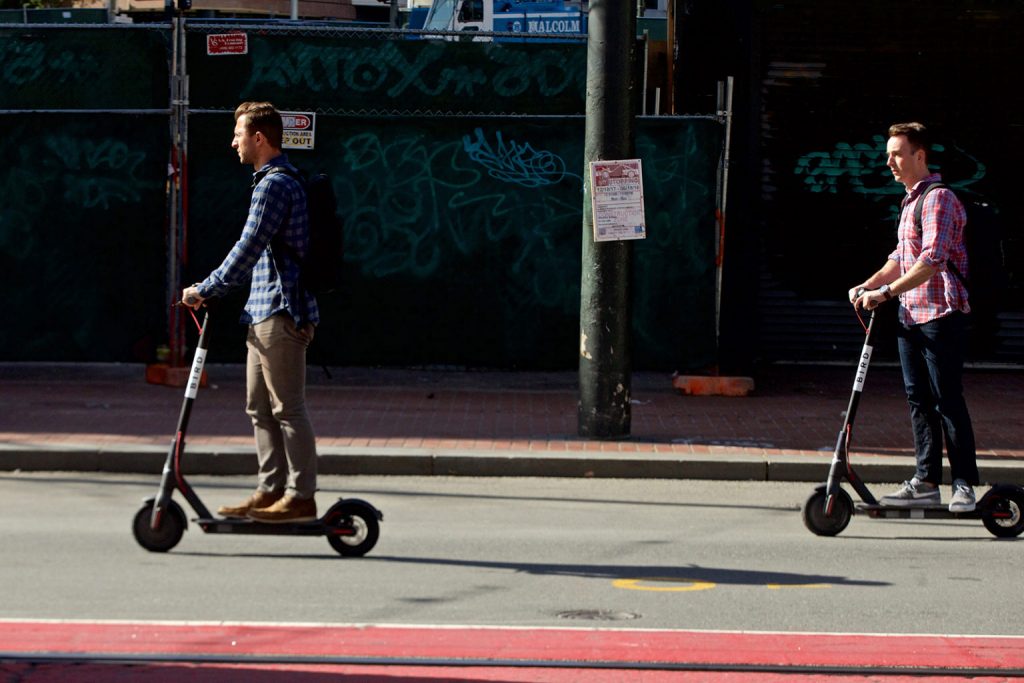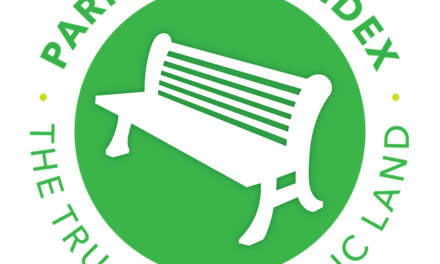If we had any skepticism about the entry of the Bird motorized scooters into Memphis, it was destroyed in our walk down Main Street yesterday to lunch. There, scooters were being ridden by people from prominent business leader Billy Orgel to office workers in jackets and ties to tourists motoring through downtown.
Memphis has sometimes been criticized for waiting too long to pursue the latest thing, but on this one, the city is on the front edge of a mobility movement, joining 14 other cities in what has been called by the media “scootermania.”
There are many reasons to be excited by yet another way to get around the city. Since last fall, the city has added the 600 bikes of Explore Bike Share and 30-50 scooters with My City Rides. Now, there are also 200 electric scooters from Bird, the electric scooter start-up whose valuation multiplied to $1 billion by the end of May.
Bird is stirring up a great deal of conversation in cities across the U.S., and while cities like Nashville are throwing obstacles in its way, City of Memphis government – led by Councilman Kemp Conrad – paved the way for the 200 scooters to come here in record time, positioning Memphis as a city welcoming and ready for the On-Demand Economy.
In fact, Memphis City Council will review a shared mobility ordinance today that sets out the ground rules for “shared use mobility bicycles, electric assist bicycles, and electric scooters.” Bike Share and Bird are now operating under temporary agreements with City of Memphis.
Positive Signs
Best of all, Bird has been seen as targeting regions where venture capital firms congregate, so perhaps, its entry into Memphis has the power to contribute to a new view of the city outside our region.
In some of the cities, the detractors of Bird are as vocal as its advocates, but the Memphis entry can prove that it matters to a highly diverse city rather than a place dominated by yuppies. Time will tell if Bird is a valuable mobility option or whether it ultimately follows the Razor scooter and Segway, but it’s exciting that Memphis will figure directly in this process.
It’s a positive sign that city government sees its overriding objective as mobility, which opens up all kinds of public transportation options for Memphians. In its other cities, Bird has been praised as a fast, cheap, city-friendly alternative to ride-hailing services, and considering that we can’t hail cabs, it is even more relevant here since it opens up new options for individualizing our transportation needs.
Finally, the speed in which Bird moved from an idea to a reality is a testament to the new collaboration found in City Hall. We just saw it play out in budget hearings and Bird is a case study for the new attitude in city government. Scooters and bike share are popular because they are ubiquitous, and it’s encouraging to see city government cooperation ubiquitous as well.
The following is a commentary by Councilman Conrad explaining how Bird came to Memphis and why he is such an enthusiastic advocate for it:
By Kemp Conrad
Sun Tzu – “Opportunities Multiply As They Are Seized”
The famous Chinese military leader and strategist Sun Tzu would have been pleased with the way Memphis continued to multiply opportunities by seizing the day and bringing hundreds of electric scooters to Memphis to augment the city’s shared mobility eco-system.
Memphis, and the Silicon Valley startup, Bird, worked together in less than a week’s time, to craft a temporary operating agreement to launch in Memphis. On Tuesday (today), Mayor Strickland and I will introduce the shared mobility ordinance to the Memphis City Council. The city does have an interest in fair regulation that does not stifle innovation, but fairly regulates, shared mobility opportunities. We believe our legislative framework achieves this goal.
First, lets look at the forces at work that are making opportunities like this possible. Shared mobility options are a result of “The Demand Economy” – the economic activity created by technology companies that fulfill consumer demand via the immediate provisioning of goods and services. Uber, Lyft, and AirbnB are companies using technology to match supply and demand and disrupt traditional business models.
The next generation of innovation that will have huge implications for American cities, based on the Demand Economy, are “Shared Mobility” options. Shared Mobility refers to the shared used of a vehicle, bicycle, public transportation, or other transportation mode. It is a transportation strategy that allows users to access transportation services on an as-needed basis in an affordable manner.
I believe these low cost, on demand options, will make up a significant and important part of the transportation infrastructure in the future. This is evidenced by Bird’s recent purported valuation of about $2 Billion.
Mobility As The Goal
Enter electric scooters – the next generation of shared mobility options. These scooters are environmentally friendly and run at 15 mph. They are convenient and offer an affordable option to travel short distances. Also, unlike the current bike share model, these shared scooters are “dockless,” meaning they can be dropped off and picked up almost anywhere – and located by the next user via the app. In certain high use areas, such as downtown, we will work with providers to create “nests” where multiple scooters can be stored for the next riders.
To use the service, Memphians will simply download the app on a phone, enter a credit card and “unlock” the scooter for use.
This alternative mode of transportation doesn’t involve cars, lessens traffic, is better for the environment, and is less wear and tear on Memphis streets. And it comes at no cost to the city, no incentives were used, and this will generate revenue the city can use to advance better mobility options. These “first and last mile” options add critically needed commute options in a city as geographically large as Memphis where a major challenge is getting folks to a good job.
Another benefit of the demand economy is how much money folks are able to make on their own time. What happens at night to these scooters you ask? Bird pays from $5-20 per scooter for Memphians to pick up the scooters at night, inspect them, and charge them – placing them back out the next day at a location based on demand history. Bird will add to their flock as demand picks up over time. This solution offers Memphians the opportunity to build wealth on their own time, and their own schedule.
The “New” Memphis
Are there issues to be concerned with? Of course.
We believe our ordinance will address these matters and we will adapt over time. Safety is an issue, and as an example, when you download the app, Bird will send you a free helmet. Riding on sidewalks is not permitted – but Memphis’s vast bike infrastructure will also be leveraged by this innovative transportation solution. We can thank former Mayor AC Wharton for this proud legacy.
Just a month ago, Memphis recently launched its very deliberate and successful bike share program with 60 stations strategically located through the city and a fleet of 600 bikes. This program is based on equity and inclusion with a goal of adding mobility options for Memphians. I commend Memphis Chief Operating Officer Doug McGowen and Mayor Strickland for their vision to bring this exciting program to reality. This program created 13 full time jobs and another program, my city rides, is also just getting underway.
Innovate Memphis was also key in this accomplishment – and because of the research already completed for a comprehensive shared mobility regulatory framework, the Board could land in Memphis. Credit also goes to the City Council’s lobbyist, Sam Reed of The Ingram Group, who also works with Bird. The ROI of the Council’s relationship with Ingram of this outcome alone will be off the chart and alone justifies the investment by the Council to hire Ingram.
This announcement and launch illustrates the new Memphis – A fresh, innovative, forward thinking approach that is open to new business models. Memphis’s adoption of this new technology and service is something that Nashville, Austin, San Francisco, and Denver are still trying to figure out. Memphis is only the 15th city to have Bird scooters. Memphis is a government that’s as entrepreneurial as our river city, swashbuckling roots that gave us FedEx, Autozone, and Holiday Inns.
Carpe Diem
In addition to our leadership in shared mobility, Memphis was the first city in TN to automatically collect taxes from companies such as Airbnb and VRBO. Memphis was also on the verge of passing rideshare regulation, until the state legalized this ubiquitous service statewide – legislation that was modeled on the work done in Memphis.
Obtaining these next generation scooters in record time was only possible due to the collaborative working relationship between the Council and the Mayor’s team. Laying this foundation at the Council was my main strategic goal as Chairman of the body in 2016, and Mayor Strickland and his team have been fantastic partners.
This legislative and executive branch working together is racking up wins at a rapid clip and the spirit of partnership has come to define the modern era of the Memphis political environment.
Our future is bright, opening up opportunities for all Memphians. So go find an opportunity today, seize it, and multiply it. We are working hard to create a Memphis where anything is possible.
Kemp Conrad represents Super District 9-1 on the Memphis City Council and is the immediate Past Chairman. He currently Chairs the Government Relations Committee.
***
Join us at the Smart City Memphis Facebook page for daily articles, reports, and commentaries that are relevant to Memphis.





And yet:
on the county side:
commissioner shaeffer is wanting to delete bikeway funding from major road projects across the county.
and so it goes..
Heidi is gone Sept. 1
Didn’t the County Commission in fact adopt the greenprinting plan yesterday and then strip the money for bike lanes from it?
September 1 can’t come fast enough.
Not so sure about the electric scooters. I was in LA where they are everywhere. Really more of a public nuisance than anything. They were left just like litter anywhere. Riders use them moving fast on streets, sidewalks and in traffic. No helmets. A danger to pedestrians for sure in crowded areas.